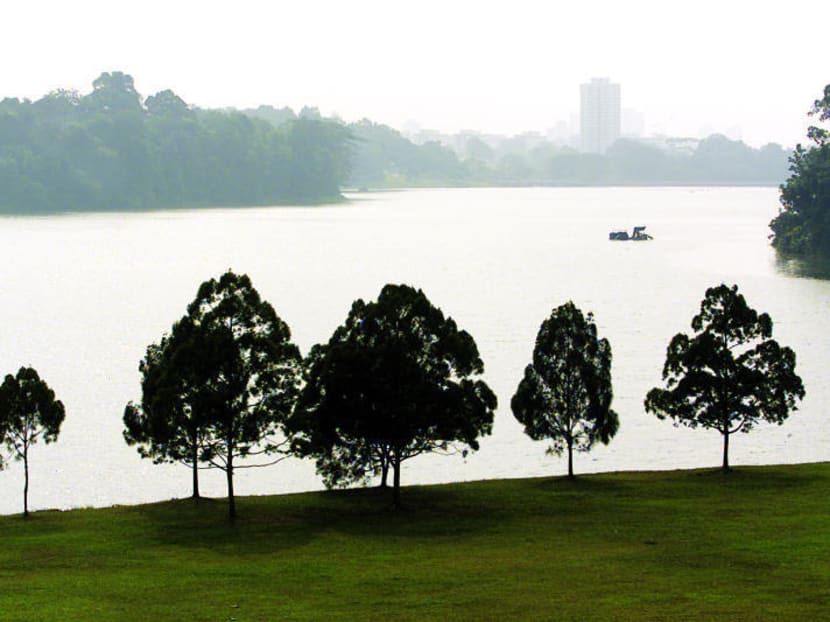Pilot projects using water sites to generate solar power launched
SINGAPORE — Reservoirs will have to become catchments for both water and energy, as the Republic becomes increasingly dependent on the latter for its water supply, Minister for the Environment and Water Resources Vivian Balakrishnan said yesterday.
SINGAPORE — Reservoirs will have to become catchments for both water and energy, as the Republic becomes increasingly dependent on the latter for its water supply, Minister for the Environment and Water Resources Vivian Balakrishnan said yesterday.
Dr Balakrishnan’s comments came as national water agency PUB announced that it has kick-started two pilot projects to harness solar power by building rooftop solar panels at Choa Chu Kang Waterworks and installing floating solar systems on Tengeh Reservoir. Together, the projects will generate energy equivalent to the average annual energy consumption of about 1,000 Housing and Development Board households.
Noting that the significance of Singapore’s investment in sustainable resources was underscored during the dry spell earlier this year, the PUB pointed out that NEWater and desalination production are energy-intensive processes and increasing their ratio in the total water supply would mean incurring higher energy costs.
Writing on Facebook, Dr Balakrishnan said: “Desalination and water recycling through reverse osmosis have enhanced our water security considerably over the past decade. However, we are now even more dependent on energy for our water supply.”
He added: “We need to constantly look out for more sustainable sources of energy. Solar energy is a promising avenue — but Singapore will always be short of land.”
The S$2.3 million pilot at Choa Chu Kang Waterworks will produce energy from solar power to meet up to 50 per cent of the facility’s peak daytime electricity supply for water treatment equipment, lighting and air-conditioning.
The tender was awarded yesterday and preparatory work is expected to start in the middle of this month. The solar panels — which will be in place for 20 years — are slated to start operation by the first quarter of next year, said the PUB, adding that it plans to extend the deployment of solar panels to other waterworks over the next two to three years.
Plans to install the region’s first floating photovoltaic pilot project at Tengeh Reservoir was first announced in 2011. The S$11 million project is led by the Economic Development Board, in partnership with the PUB, and managed by the Solar Energy Research Institute of Singapore.
The energy generated by the 3-ha floating system will be channelled to the national power grid. Dr Balakrishnan said the authorities will assess the impact on water ecology as they explore alternative cost-effective and sustainable sources of energy. A preliminary assessment has found potential benefits including reduction in reservoir evaporative rate and a fall in algal growth, the PUB said.
Solar power was once considered too expensive for widespread use. In recent years, the costs of generating solar power has tumbled and it has become an increasingly viable energy solution. For example, the PUB has already invested in the Solar Park at Marina Barrage, one of the largest collection of solar panels in Singapore.
The HDB had previously announced plans to fit 200 HDB blocks with solar photovoltaic systems by next year.
At Pulau Ubin, a micro-grid — powered by biodiesel and solar cells located on three sites around the island — is being tested as an alternative source of electricity for a group of around 30 residents.
PUB chief technology officer Harry Seah said solar power is the most promising sustainable resource for equatorial Singapore. Through the two pilot projects, he said, the PUB aims to “analyse the capabilities of solar energy for high voltage operational efficiency, and utilise the large expanse of our reservoir’s area which provides a good opportunity for testbedding”.
Before it was reconstituted as the national water agency in 2001, the PUB was known as the Public Utilities Board which also regulated the electricity and gas industries.
Dr Balakrishnan quipped: “I am slightly bemused that PUB is returning to electricity generation, albeit in a small way.”







